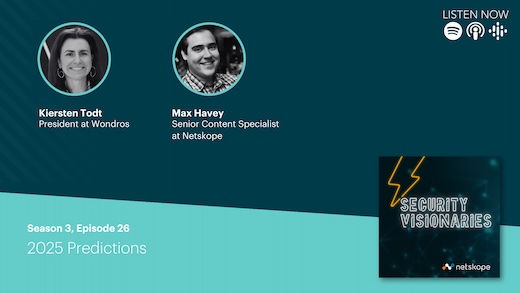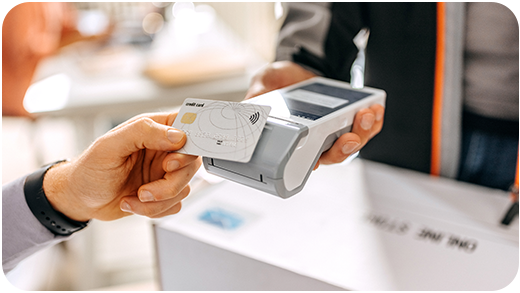Quantify the value of Netskope One SSE – Get the 2024 Forrester Total Economic Impact™ study
-
Why Netskope
- Why Netskope
Why Netskope
Changing the way networking and security work together.
Get the reportA Leader in SSE. Now a Leader in Single-Vendor SASE.Learn why Netskope debuted as a leader in the 2024 Gartner® Magic Quadrant™️ for Single-Vendor Secure Access Service Edge
- Why Netskope
Our Customers
Netskope serves more than 3,400 customers worldwide including more than 30 of the Fortune 100
Get the eBookCustomer Visionary SpotlightsRead how innovative customers are successfully navigating today’s changing networking & security landscape through the Netskope One platform.
- Why Netskope
Our Partners
We partner with security leaders to help you secure your journey to the cloud.
Learn about Netskope PartnersNetskope’s partner-centric go-to-market strategy enables our partners to maximize their growth and profitability while transforming enterprise security.
-
Platform
- Platform
Netskope One Platform
Netskope One is a converged security and network as a service platform.
Get the white paperYour Network of TomorrowPlan your path toward a faster, more secure, and more resilient network designed for the applications and users that you support.
- Platform
Technology Partners & Integrations
Netskope partners with the strongest companies in enterprise technology.
Learn about Cloud ExchangeNetskope Cloud ExchangeThe Netskope Cloud Exchange (CE) provides customers with powerful integration tools to leverage investments across their security posture.
-
Products
- Products
Security Service Edge
Protect against advanced and cloud-enabled threats and safeguard data across all vectors.
Go to Products OverviewThe platform of the future is NetskopeSecurity Service Edge (SSE), Cloud Access Security Broker (CASB), Cloud Firewall, Next Generation Secure Web Gateway (SWG), and Private Access for ZTNA built natively into a single solution to help every business on its journey to Secure Access Service Edge (SASE) architecture.
- Security Service Edge (SSE)
- Next Gen Secure Web Gateway (SWG)
- Firewall (FWaaS)
- Remote Browser Isolation (RBI)
- Cloud Access Security Broker (CASB)
- SaaS Security Posture Management (SSPM)
- Private Access
- Data Loss Prevention (DLP)
- Data Security Posture Management (DSPM)
- Device Intelligence
- Threat Protection
- Security Service Edge (SSE)
- Products
SD-WAN
Confidently provide secure, high-performance access to every remote user, device, site, and cloud.
Learn about Next Gen SASE BranchNext Gen SASE Branch is hybrid — connected, secured, and automatedNetskope Next Gen SASE Branch converges Context-Aware SASE Fabric, Zero-Trust Hybrid Security, and SkopeAI-powered Cloud Orchestrator into a unified cloud offering, ushering in a fully modernized branch experience for the borderless enterprise.
- Products
Secure Access Service Edge
Netskope One SASE provides a cloud-native, fully-converged and single-vendor SASE solution.
Get the eBookSASE Architecture For DummiesGet your complimentary copy of the only guide to SASE design you’ll ever need.
-
Solutions
- Solutions
Network Transformation
Achieve agility and efficiency through digital transformation.
Go to Solutions OverviewLearn about NewEdgeMake the move to market-leading cloud security services with minimal latency and high reliability. - Solutions
Security modernization
Meet the security challenges of today and tomorrow.
Learn how we secure generative AI useSafely enable the use of generative AI applications with application access control, real-time user coaching, and best-in-class data protection.- Advanced Threat Protection
- Data Protection
- Hybrid Work
- Insider Risk
- Maintain Compliance
- Replace VPNs
- Safely Enable ChatGPT and Generative AI
- Secure Managed Cloud Applications
- Secure Unmanaged Cloud Services
- AWS, Azure & GCP
- Advanced Threat Protection
- Solutions
Frameworks
Embrace the regulatory frameworks shaping cybersecurity.
Go to Solutions OverviewLearn about Zero TrustZero trust solutions for SSE and SASE deployments - Solutions
Government and Industries
Netskope helps the largest agencies and enterprises in the world secure their journey to the cloud.
Learn about Netskope GovCloudNetskope achieves FedRAMP High AuthorizationChoose Netskope GovCloud to accelerate your agency’s transformation.
-
Resources
- Resources
Resources
Learn more about how Netskope can help you secure your journey to the cloud.
Play the podcast Browse all podcastsSecurity Visionaries Podcast2025 Predictions
In this episode of Security Visionaries, we're joined by Kiersten Todt, President at Wondros and former Chief of Staff for the Cybersecurity and Infrastructure Security Agency (CISA) to discuss predictions for 2025 and beyond. - Resources
Blog
Learn how Netskope enables security and networking transformation through secure access service edge (SASE)
Read the blogLatest BlogsRead how Netskope can enable the Zero Trust and SASE journey through secure access service edge (SASE) capabilities.
- Resources
Events and Workshops
Stay ahead of the latest security trends and connect with your peers.
Explore sessionsSASE Week 2024 On-DemandLearn how to navigate the latest advancements in SASE and zero trust and explore how these frameworks are adapting to address cybersecurity and infrastructure challenges
- Resources
Security Defined
Everything you need to know in our cybersecurity encyclopedia.
Learn about SASEWhat is SASE?Learn about the future convergence of networking and security tools in today’s cloud dominant business model.
- Security Defined overview
- What is SASE?
- What is Security Service Edge?
- What is a Cloud Access Security Broker (CASB)?
- What is Zero Trust Network Access (ZTNA)?
- What is a Next Generation Secure Web Gateway (SWG)?
- What is Data Loss Prevention (DLP)?
- What is SD-WAN?
- What is Generative AI?
- What is SSPM?
- What is FedRamp?
- Security Defined overview
-
Company
- Company
Company
We help you stay ahead of cloud, data, and network security challenges.
Find out moreSupporting sustainability through data securityNetskope is proud to participate in Vision 2045: an initiative aimed to raise awareness on private industry’s role in sustainability.
- Company
Careers
Join Netskope's 3,000+ amazing team members building the industry’s leading cloud-native security platform.
Join the teamHelp shape the future of cloud securityAt Netskope, founders and leaders work shoulder-to-shoulder with their colleagues, even the most renowned experts check their egos at the door, and the best ideas win.
- Company
Customer Solutions
We are here for you and with you every step of the way, ensuring your success with Netskope.
Go to Customer SolutionsNetskope dedicated service and support professionals will ensure you successful deploy and experience the full value of our platform.- Professional Services
- Customer Success
- Technical Support
- Service Delivery Partners
- Customer Community
- Product Documentation
- Support Portal
- Trust Portal
- Professional Services
- Company
Training and Accreditations
Netskope training will help you become a cloud security expert.
Learn about Training and CertificationsSecure your digital transformation journey and make the most of your cloud, web, and private applications with Netskope training.- Netskope Security Cloud Introductory Online Technical Training
- Netskope Security Cloud Operation and Administration (NSCO&A)
- Netskope Security Cloud Implementation and Integration (NSCI&I)
- Netskope Security Cloud Introductory Online Technical Training
- Why Netskope
Changing the way networking and security work together.
- Our Customers
Netskope serves more than 3,400 customers worldwide including more than 30 of the Fortune 100
- Our Partners
We partner with security leaders to help you secure your journey to the cloud.
Learn why Netskope debuted as a leader in the 2024 Gartner® Magic Quadrant™️ for Single-Vendor Secure Access Service Edge
Get the report
Read how innovative customers are successfully navigating today’s changing networking & security landscape through the Netskope One platform.
Get the eBook

- Netskope One Platform
Netskope One is a converged security and network as a service platform.
- Technology Partners & Integrations
Netskope partners with the strongest companies in enterprise technology.
Plan your path toward a faster, more secure, and more resilient network designed for the applications and users that you support.
Get the white paper
The Netskope Cloud Exchange (CE) provides customers with powerful integration tools to leverage investments across their security posture.
Learn about Cloud Exchange
- Security Service Edge
Protect against advanced and cloud-enabled threats and safeguard data across all vectors.
- SD-WAN
Confidently provide secure, high-performance access to every remote user, device, site, and cloud.
- Secure Access Service Edge
Netskope One SASE provides a cloud-native, fully-converged and single-vendor SASE solution.
- Security Service Edge (SSE)
- Next Gen Secure Web Gateway (SWG)
- Firewall (FWaaS)
- Remote Browser Isolation (RBI)
- Cloud Access Security Broker (CASB)
- SaaS Security Posture Management (SSPM)
- Private Access
- Data Loss Prevention (DLP)
- Data Security Posture Management (DSPM)
- Device Intelligence
- Threat Protection
Security Service Edge (SSE), Cloud Access Security Broker (CASB), Cloud Firewall, Next Generation Secure Web Gateway (SWG), and Private Access for ZTNA built natively into a single solution to help every business on its journey to Secure Access Service Edge (SASE) architecture.
Go to Products Overview
Netskope Next Gen SASE Branch converges Context-Aware SASE Fabric, Zero-Trust Hybrid Security, and SkopeAI-powered Cloud Orchestrator into a unified cloud offering, ushering in a fully modernized branch experience for the borderless enterprise.
Learn about Next Gen SASE Branch
Get your complimentary copy of the only guide to SASE design you’ll ever need.
Get the eBook
- Network Transformation
Achieve agility and efficiency through digital transformation.
- Security modernization
Meet the security challenges of today and tomorrow.
- Frameworks
Embrace the regulatory frameworks shaping cybersecurity.
- Government and Industries
Netskope helps the largest agencies and enterprises in the world secure their journey to the cloud.


Choose Netskope GovCloud to accelerate your agency’s transformation.
Learn about Netskope GovCloud
- Resources
Learn more about how Netskope can help you secure your journey to the cloud.
- Blog
Learn how Netskope enables security and networking transformation through secure access service edge (SASE)
- Events and Workshops
Stay ahead of the latest security trends and connect with your peers.
- Security Defined
Everything you need to know in our cybersecurity encyclopedia.
- Security Defined overview
- What is SASE?
- What is Security Service Edge?
- What is a Cloud Access Security Broker (CASB)?
- What is Zero Trust Network Access (ZTNA)?
- What is a Next Generation Secure Web Gateway (SWG)?
- What is Data Loss Prevention (DLP)?
- What is SD-WAN?
- What is Generative AI?
- What is SSPM?
- What is FedRamp?
2025 Predictions
In this episode of Security Visionaries, we're joined by Kiersten Todt, President at Wondros and former Chief of Staff for the Cybersecurity and Infrastructure Security Agency (CISA) to discuss predictions for 2025 and beyond.

Read how Netskope can enable the Zero Trust and SASE journey through secure access service edge (SASE) capabilities.
Read the blog
Learn how to navigate the latest advancements in SASE and zero trust and explore how these frameworks are adapting to address cybersecurity and infrastructure challenges
Explore sessions
Learn about the future convergence of networking and security tools in today’s cloud dominant business model.
Learn about SASE
- Company
We help you stay ahead of cloud, data, and network security challenges.
- Careers
Join Netskope's 3,000+ amazing team members building the industry’s leading cloud-native security platform.
- Customer Solutions
We are here for you and with you every step of the way, ensuring your success with Netskope.
- Training and Accreditations
Netskope training will help you become a cloud security expert.
Netskope is proud to participate in Vision 2045: an initiative aimed to raise awareness on private industry’s role in sustainability.
Find out more
At Netskope, founders and leaders work shoulder-to-shoulder with their colleagues, even the most renowned experts check their egos at the door, and the best ideas win.
Join the team














